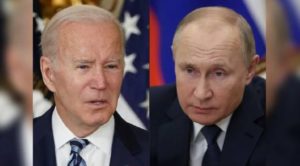
Joe Biden and Vladimir Putin held talks on Monday over the Russia-Ukraine crisis.
After weeks of tensions, Russia announced today that it was withdrawing some of its troops near the Ukraine border in first signs of de-escalation with the West.
In what can be called the worst crisis between Russia and the West since the Cold War, US had a stern warning of a full-scale invasion and an assault on Ukraine capital Kyiv last week as tensions refused to simmer down. Russia launched its biggest naval drills in years across the Black Sea after the warning.
This morning, Russian defence ministry spokesman told AFP said that some forces deployed near Ukraine had completed their exercises and were packing up to leave.
This comes a day after US President Joe Biden and his Russian counterpart Vladimir Putin held talks via video conference. Biden said a Russian invasion of Ukraine would cause “widespread human suffering” and that although the West wants to end the crisis diplomatically, they are “equally prepared for other scenarios”.
Here are 5 points to know about the Russia-Ukraine crisis:
Close1. In November last year, satellite images revealed a build-up of 1,00,000 Russian troops and heavy military equipment along the borders of pro-West Ukraine. In December, Joe Biden warned Russia of economic sanctions if it invades Ukraine.
2. The Kremlin had a host of security demands for the West. Russia insists that NATO must assure that Ukraine will never be admitted as a member. Russia also demanded that NATO must cease all military activity in eastern Europe.
3. In January, Biden assured Ukraine President Volodymyr Zelenskyy that the US will “respond decisively” if Russia invades Ukraine. NATO put its forces on standby and reinforces its military presence in Eastern Europe with more ships and fighter jets.
4. Several countries including US, Germany, Italy, Britain, Ireland, Belgium, Luxembourg, the Netherlands, Canada, Norway, Estonia, Lithuania, Bulgaria, Slovenia, Australia, Japan, Israel, Saudi Arabia and UAE urged citizens to leave Ukraine amid the possibility of a full-blown war. Many countries warned that a military evacuation may not be possible if tensions break out.
5. Diplomatic talks between United States and Russian officials yielded no result as Washington reiterated they cannot accept Kremlin’s demands. Vladimir Putin said his concerns have not been addressed but was ready to keep talking. He denied planning an invasion on Ukraine after Biden warned of a likely attack in February.
(With inputs from AFP)




 Driving Naari Programme launched in Chandigarh
Driving Naari Programme launched in Chandigarh






























